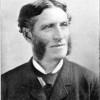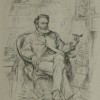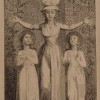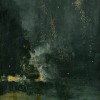
Peter Melville Logan, “On Culture: Matthew Arnold’s Culture and Anarchy, 1869″
Matthew Arnold’s Culture and Anarchy spells out one of two major theories of culture to emerge around 1870. His theory defines culture in idealist terms, as something to strive for, and in this it helped to shape twentieth-century thinking about the value of the humanities in higher education. Arnold’s ideas were closely related to those of Edward B. Tylor, who proposed the descriptive theory of culture adopted by the emerging discipline of anthropology at about the same time.

Jonathan Farina, “On David Masson’s British Novelists and their Styles (1859) and the Establishment of Novels as an Object of Academic Study”
This essay shows how the publication of David Masson’s British Novelists and their Styles, the first monograph on fiction by a professor of English literature, institutionalized the study of fiction by representing novels as material evidence of otherwise ephemeral, ideological, unconscious, or otherwise invisible “currents” of history. Other Victorian theories of fiction were more manifestly influential in establishing the formalist modes of fictional analysis and narratology that have since dominated the discipline, but Masson’s work nevertheless exhibits investments in feminism, cosmopolitanism, liberalism, statistics, ideology, and history that uncannily anticipate the interests of modern scholars of Victorian fiction. However generically unfamiliar it might look, then, Masson’s work marks the emergence of the cultural interests, disciplinary objectives, and other conditions of representation that underwrite academic criticism as we now know it.

Ghislaine McDayter, “On the Publication of William Godwin’s Memoirs of the Author of A Vindication of the Rights of Woman, 1798″
William Godwin’s publication of Mary Wollstonecraft’s memoirs in 1798 had a massive impact on Wollstonecraft’s posthumous reputation and literary legacy. While Godwin’s refusal to finesse an increasingly conservative readership by downplaying his wife’s sexual independence in the Memoirs may have initiated a violent rejection of Wollstonecraft’s work for nearly a century, it also highlighted the important political radicalism of her work that might otherwise have been forgotten.

Nicholas Frankel, “On the Whistler-Ruskin Trial, 1878”
In 1877 the painter James McNeill Whistler initiated an action for libel against the critic John Ruskin, who had defamed Whistler and his paintings in print. The legal outcome of the resulting trial—a technical verdict for Whistler, but with damages of just one farthing and no award of costs—satisfied nobody and represents a turning point in the principal antagonists’ lives. As importantly, it heralded a reconfiguration in the respective positions of the critic and the artist, if not a reconceptualization of the very meaning of these terms. The trial exposed to scrutiny the spiritualizing mission of criticism itself while bringing about an elevation and expansion of the concept of the artist. As Shearer West has argued, it also offered an important precedent for the power of laughter and wit to demolish the self-representations of established power.
